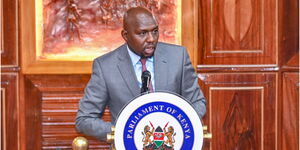A new law that will allow the Kenya Police to listen in to private phone calls without a court warrant allowing them to do so, has been proposed by the Director of Public Prosecutions (DPP) Keriako Tobiko.
The DPP has asked the National Assembly to pass the law that will legalise the use of modern technology such as phone tapping and covert CCTV footage, without a court warrant, to secure evidence that can be used to convict suspects in Kenyan courts.
The current Constitution under the Bill of Rights outlaws invasion of privacy unless where law enforcers are granted warrants by the court.
"The ODPP (Office of the Director of Public Prosecutions) is employing ways to embrace new technologies, including wiretaps, covert surveillance, control delivery and video conferencing by witnesses where applicable," a report submitted to Parliament by the DPP read.
The DPP further states that investigations into graft and economic crimes cases, in the Kenyan context, needs to be reviewed and updated.
"In view of the changing dynamics, counsel (prosecutors) need to continue being sensitised on the same, to keep up with the developments in the legal framework and emerging jurisprudence in the field," Mr Tobiko wrote.
The ODPP, the EACC, the National Intelligence Service (NIS), the Kenya Revenue Authority (KRA), the Directorate of Criminal Investigations (DCI) and the Assets Recovery Agency (ARA) are members of the multi-agency task team (MATT) which will benefit from the law in their pursuit to prosecute sophisticated crime.












